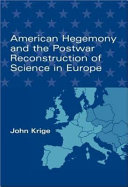
American Hegemony and the Postwar Reconstruction of Science in Europe
By - Krige, John.
Floor
-
Floor 2
Published
-
Cambridge, Mass. : MIT Press, c2006.
ISBN 10 - 0262112973
ISBN 13 - 9780262112970
Book Status
-
1 Qnty Available with us.
Subject
-
Science--Europe--History--20th century.
Shelf No
-
1
Call Number
-
509.4090 KRI
Physical Description
-
viii, 376 p. ; 24 cm.
Notes
-
Includes bibliographical references and index.